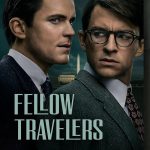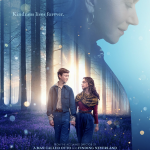An American journalist Ruth who travels to Poland with her father Edek to visit his childhood places. But Edek, a Holocaust survivor, resists reliving his trauma and sabotages the trip creating unintentionally funny situations.4
Chuck says:
Ruth has little patience where her father, Edek is concerned. With her mother having recently passed away, she’s planned a trip to visit Poland in an effort to find out more about her heritage. She’s a bit irked when her father insists on accompanying her, her irritation mounting when he refuses to ride trains to various destinations and derails things when he insists on going anywhere but the town of his birth. That he openly flirts with other women so soon after his wife’s death doesn’t help, while his reticence to visit the death camp at Auschwitz, where he and his beloved were once held, is inexplicable to Ruth. Seems she understands even less about her father than she thought.
Set in Warsaw, circa 1991, Julia von Heinz’s “Treasure” looks at this unique father-daughter dynamic, a film that is thematically sound but stumbles in its execution. Lurching from one awkward moment to the next, the plot contrivances wear away at the movie’s credibility, as does the inexplicable behavior of one of the main characters. However, its biggest fault lies in the way it fails to fully examine the repercussions of the Holocaust, at times using the tragedy as nothing more than a plot device.
The journey to Lodz, where Edek was raised, is riddled with side trips and delays, all of them caused by the elder reluctant traveler. A jaunt to a village that supposedly contains pieces of the Berlin Wall or an unexpected stop at a posh hotel slow the trip to a crawl. During these sojourns, the tension between father and daughter continues to mount, the disconnect between them meant to be comical. It all falls horribly flat, not a single laugh found in these awkward moments.
Stephen Fry delivers a wholly winning performance, his Edek a gregarious man who loves people and seemingly doesn’t have a care in the world. Nothing shakes him, each difficulty that comes his way dealt with a slight shrug and minor readjustment. Of course, he’s living in denial where his past is concerned and when he’s finally forced to confront it, the pain Fry conveys is devastating.
Most of the problems with the film stem from Ruth, an insufferable character whose behavior is incongruous with her background. Her father brags on her throughout, telling anyone who will listen that she is a famous New York journalist. There’s no reason to doubt this assertion except for her consistently obtuse behavior. Oblivious to her father’s obvious trauma, she fails to consider his feelings or those of the citizens of Lodz, all of whom are hanging on by a thread, trying to eke out a living in a city that never recovered from the destruction that had descended upon it.
The sort of role Lena Dunham has become associated with, Ruth is self-absorbed and entitled, throwing money at any problem that presents itself, running roughshod over others in an effort to reclaim a heritage that was never hers. She is the epitome of the ugly American but more troubling from a narrative perspective is that this intelligent woman is so blind to her father’s pain. It’s a conceit that doesn’t hold water and wears at the viewers’ patience.
While our sympathy for Edek is earned, my disdain for his daughter prevented me from becoming fully engaged. That the sequence in which they arrive at Auschwitz lands with a thud speaks to the tonal dissonance of the piece. Much like Ruth, “Treasure” reveals itself to be a muddle, a movie that lacks cohesion which ultimately undercuts its message.
2 Stars




